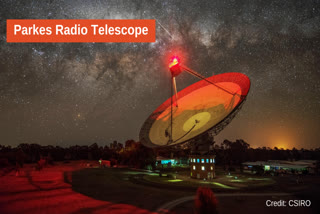CSIRO Australia:The iconic Parkes radio telescope or the Dish has been officially recognized for its contribution to Australian astronomy & humankind's understanding of the universe with its addition to the national heritage list.
Minister for the Environment, Sussan Ley, has announced that the telescope is owned and operated by Australia’s National Science Agency, CSIRO and is the first functioning scientific instrument to be added to the list.
- It is a 64-meter diameter telescope and was completed in 1961, and continues to be used by Australian and international astronomers in the search for the answers to some of the Universe’s greatest scientific questions.
CSIRO’s Parkes radio telescope during construction Credit: CSIRO CSIRO’s Parkes radio telescope during construction Credit: CSIRO CSIRO’s Parkes radio telescope shortly after its completion in 1961 Credit: CSIRO In July 1969, alongside NASA’s Honeysuckle Creek Station near Canberra, the telescope played a key role in receiving the television signals from the Apollo 11 mission to the Moon and sharing this technological feat with 600 million people around the world.
“The Dish is part of Australia’s proud cultural and scientific history and to this day continues to serve as an important tool in our understanding of the Universe,” said Karen Andrews, Minister Industry, Science & Technology.
“As Australia again plays a critical role in the next efforts to put people on the Moon, and go on to Mars, this listing couldn’t come at a more appropriate time.”
CSIRO Chief Executive Dr Larry Marshall said the Parkes radio telescope is an icon of Australian science and innovation.
“Australia has a long and proud history of science-driven innovation, from our first digital computer – CSIRAC to the first air defense radar which helped to pave the way for the new field of radio astronomy after World War II, and more recently the development of fast Wi-Fi that connects people across the world to the internet,” Dr Marshall said.
“While the Parkes telescope may be old enough to qualify for the national heritage list, it continues to operate as one of the world’s leading astronomy instruments, observing the universe day and night, seven days a week, with the most advanced radio receiver systems in the world."
Its instrumentation has been continually upgraded so the telescope is now 10,000 times more sensitive than when it was first built. Using the Parkes telescope astronomers have found most of the known pulsars, rapidly spinning neutron stars, and identified the first ‘fast radio burst’, a phenomenon that researchers around the world are racing to explain.
A new ultra-wideband receiver, shown here in a testing chamber, was installed on CSIRO’s Parkes radio telescope in 2018. Credit: CSIRO Professor Naomi McClure-Griffiths from the Australian National University spent over 2000 hours observing the Milky Way using the Parkes telescope for the Southern Galactic Plane Survey and the Galactic All-Sky Survey.
“Parkes was the very first telescope which I visited as a student and it has remained a constant companion throughout my career,” Professor McClure-Griffiths said.
He further said, “The telescope has attracted an array of talented staff throughout its years, embedding a base of scientific and intellectual knowledge and culture within our region which has in turn further stimulated a scientific interest within the broader community and inspired our young citizens.”
Some of the top achievements of Australia's National Science Agency, CSIRO Parkes radio telescope’s are:-
The top achievements of CSIRO Parkes radio telescope The top achievements of CSIRO Parkes radio telescope 2018-19: NASA use Parkes to support the Canberra Deep Space Communication Complex in tracking the Voyager 2 spacecraft as it enters interstellar space.
Also Read: CSIRO: M♡THer Platform for pregnant patients with gestational diabetes
